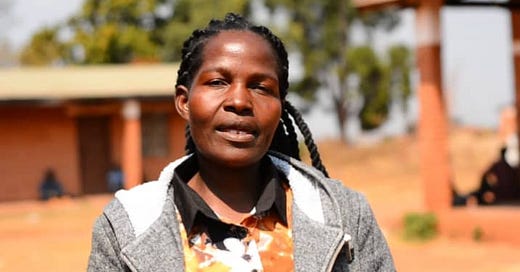Khonsolo Women Fight Back: Economic Empowerment Combats Gender-Based Violence in Malawi
The success of this initiative underscores the importance of empowering women as agents of change, enabling them to actively participate in shaping a more equitable future.
MZIMBA, Malawi-In the rural community of Khonsolo, Mzimba, women are taking a stand against gender-based violence, specifically economic violence, by learning to advocate for their rights and share in the financial benefits of their agricultural labor, writes Sopani Jalanthowa.
This initiative, spearheaded by the Khonsolo Women’s Forum in partnership with ActionAid Malawi, is empowering women to participate in family decision-making processes, particularly regarding the distribution of resources generated by their farming efforts.
Data from ActionAid Malawi reveals that economic violence against women, including withholding access to income and control over resources, is a prevalent issue in rural Malawi.
This type of violence often leads to further conflicts and physical abuse within families.
The "Power Analysis" training program aims to break down these barriers, equipping women with the knowledge and skills to voice their needs and influence decisions related to family finances.
“This training has been an eye opener,” said Veronica Kumwenda, a participant from Khonsolo trading area.
“Now we will be able to engage our husbands in constructive discussions whenever we are discussing issues of resources in the house, especially after selling farm produce. Otherwise, men would sometimes monopolize the use of the resources without our say, and violence would erupt if we question them.”
The program goes beyond financial control, also addressing the issue of children's rights.
Blessings Chunga, a student from Msambanyifwa primary school, raised concerns about children being forced to work on farms during school hours.
“Sometimes parents want us to work in the gardens when our friends are in school, this also is not good as we end up losing out on other lessons,” Chunga said.
“So I ask parents to let their children help out after school; this way their rights to education will not be violated.”
Joyce Mwale, Executive Director of the Khonsolo Women’s Forum, emphasizes the program’s importance in addressing a widespread lack of awareness about women's rights.
"Many women in our communities are not aware that they have the power to influence decisions in their families, especially when it comes to the use of family resources," said Mwale.
"So, this training was mainly focused on equipping the women and girls on their capability of playing a role in such issues in a constructive manner. This would help resolve some issues which end in violence when poorly handled."
While the "Power Analysis" program is still in its early stages, the initial response from participants has been positive, indicating a potential shift in power dynamics within families. However, challenges remain.
The prevalence of deeply ingrained societal norms and the lack of legal and economic support for women in rural areas may hinder the program's long-term impact.
Similar initiatives are being implemented in other parts of Malawi and Africa.
The "Women’s Economic Empowerment Program" by the International Fund for Agricultural Development (IFAD) focuses on empowering women through access to microfinance and agricultural training.
While these programs have shown some success, critics argue that more needs to be done to address the root causes of gender inequality and violence, including legal reforms and a shift in societal attitudes.
The "Power Analysis" program in Khonsolo offers a beacon of hope.
By equipping women with the tools and confidence to advocate for their rights and influence family decisions, the program demonstrates the power of community-based initiatives to address complex social issues.
This program highlights the need for a multi-faceted approach to tackling gender-based violence, one that empowers women, educates communities, and addresses underlying structural inequalities.
As the program expands and more women participate, it has the potential to create a ripple effect, not only in Khonsolo but throughout Malawi, inspiring other communities to embrace solutions that promote gender equality and break the cycle of violence.
The success of this initiative underscores the importance of empowering women as agents of change, enabling them to actively participate in shaping a more equitable future.



